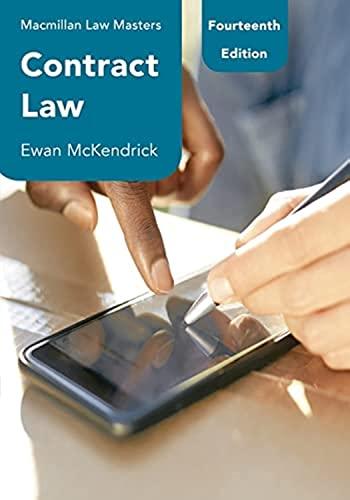Question
Affidavit and Search Warrant Writing You are a computer forensic examiner working for the Federal Bureau of Investigation (FBI). The FBI is investigating a series
Affidavit and Search Warrant Writing
You are acomputer forensic examiner working for the Federal Bureau of Investigation (FBI). The FBI is investigating a series of threats posted on social media by James T. Buchs.
Buchs is:
- a graduate student at George Mason University
- studying for a Master of Arts in Political Science
- currently a resident of Beacon Hall on the Science and Tech campus of GMU
During the course of the investigation, the FBI has been in contact with the George Mason University police department and Violence Prevention Committee (VPC). Buchs has been reported to the VPC on two previous occasions.
After evaluating the social media posts, the FBI has probable cause to believe that James T. Buchs is a credible threat to the students and faculty at George Mason University.
Your job is to wrrite a search warrant and affidavit to search Buch's residence located at:
10945 George Mason Cir #212 Manassas, VA 20110
Template for Search Warrant:
- https://www.uscourts.gov/sites/default/files/ao093.pdf
Affidavit:
- There is no template, use a word document.
- Do NOT use templates you find online, these are local/state and not the same thing.
- Warrants must specify the type of evidence that may be gathered and the locations that may be searched. Your affidavit must be DETAILED and explain your probable cause.
- Your warrant should include:
- Court Authority
- Nature of crimes being investigated
- Locations to be searched
- Property to be searched and seized
- Affidavit/Statement of Probable Cause
- You have to show probable cause that:
- A crime has been committed, and
- Evidence exists in the location you plan on searching.
- Fill in the details "how" you got to this point in your investigation.You can come up with the back-story to explain how you got to this point in the investigation, but follow the basic case scenario I provided.
- You have to show probable cause that:
- Chronology of Events
- Exhibits
- Your "return" page should be BLANK since you have not conducted a search yet.
Tips:
- You are a computer forensics examiner and your warrant should reflect this in the types of evidence you are looking to seize
- For activity 5, you will each (individually) wrrite your search warrant and affidavit - it is based off the scenario we are using for theforensic report project.
- I have given you basic information; you will come up with the "story" to support the rest. Remember, search warrants/affidavits have to be very specific.
- This should be your narrative explaining dates/times you have observed the suspect or gathered information via wiretaps, specifically what you observed, and how this gives you probable cause that a crime has been committed and specific evidence of that crime (everything you listed on the warrant) exists in the place you are requesting to search.
- In your affidavit, you have to specifically tie the crime and evidence back to the search location.
- These should be DETAILED and SPECIFIC documents. You can't just throw in "everything and the kitchen sink" - you have to have the evidence to support each item you list in the warrant. Remember - when you get to the crime scene, you can only take evidence listed in the warrant!
Step by Step Solution
There are 3 Steps involved in it
Step: 1

Get Instant Access to Expert-Tailored Solutions
See step-by-step solutions with expert insights and AI powered tools for academic success
Step: 2

Step: 3

Ace Your Homework with AI
Get the answers you need in no time with our AI-driven, step-by-step assistance
Get Started


